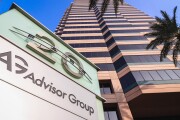Advisor Group's consolidation of its
The Phoenix-based firm with more than 10,500 financial advisors and $490 billion in client assets will move them all to a rebranded
"This was really to say, 'OK, what do we want to be in the future for our advisors, and how do we serve them best now and into the future?'" Roche said late last month after the firm
Roche said the firm will announce the name and order of the brokerage changes later this year. She noted that the new branding won't include the words "Advisor Group," despite
The company has pledged to ensure the transition will go as smoothly as possible for advisors, who are well known for leaving brokerages for rivals if they find service from the corporate office to be slipping or confusing, or if the company's strategy looks adrift in a competitive industry.
In that sense, the consolidation could play out with many similarities to an M&A deal. Competitors often jump at the opportunity when advisors find themselves in flux.
While Jenny Souza,
"We continue to see opportunities through our pipeline as a result of industry consolidation," Souza said.
That contraction has trimmed the ranks of brokerages significantly in recent years. With expenses growing by more than a third over the past decade due to the costs of technology, regulatory compliance and other increasingly complex operational needs, the number of broker-dealers globally fell by roughly a quarter in that span "either through acquisition or closure,"
"These pressures call for change," the report stated. "Without understanding the shifts and forces that have created these trends — and new factors that are now accelerating them — more broker-dealers will face additional pressures in a rapidly shifting and increasingly competitive landscape."
Advisors Group's consolidation brings "another operational burden" on top of the integration of 1,500 advisors and $70 billion in client assets from the two midsize firms the Reverence Capital Partners-backed company acquired last year —
In terms of the impact to Advisor Group's credit rating, the "long-term positives" of the merger of the eight firms into one outweigh the potential negatives, according to Hack. Moving to one firm rather than eight makes the firm simpler to manage, and the firm is taking steps to ease most of the potential disruption to advisors and clients, he said. The reclassification could help Advisor Group recruit and retain more advisors down the line, too.
"Moving to one frees up their focus strategically to look at sub-segmenting advisors across similarities in how they run their practices," Hack said. "That will likely strengthen their competitive strategy and market offering."
Last month, Moody's
At the end of 2022, the ratio of the firm's debt to earnings stood at 7.2, which was only a tick up from 7.0 at the close of the prior year despite the notable acquisitions and "significantly better" than 10.5 by the last day of December 2020, according to the agency's report. Without any more debt, Moody's projects the ratio to go down to 5.0 by the end of this year.
That forecast mirrors the agency's leverage ratio prediction on the
Publicly traded firms have far less debt than those private equity-backed rivals. For example, LPL Financial reported a leverage ratio of 1.34 at the
Hack's team closely watches metrics like recruited revenue, assets and advisors, as well as attrition rates, as it evaluates the debt issued by such firms, he said. LPL's lower leverage gives it more flexibility on the recruiting trail to give top recruits the best offers, but the interest rates are helping Advisor Group's prospects as well, Hack pointed out.
"Advisor Group is going to generate a significant amount of cash this year," he said. "We're going to see that debt servicing capacity trend up and improve. It's already been improving."
The management team knows that the consolidation will bring some "fear-mongering around that change" from rivals, Roche said. Advisor Group plans to discuss the rebranding and merger of its eight brands together in greater detail at its upcoming NXT Conference in Louisville, Kentucky, on May 23-25.
"We are really looking toward the future, and this change is about creating a place where advisors can thrive and grow," Roche said.








